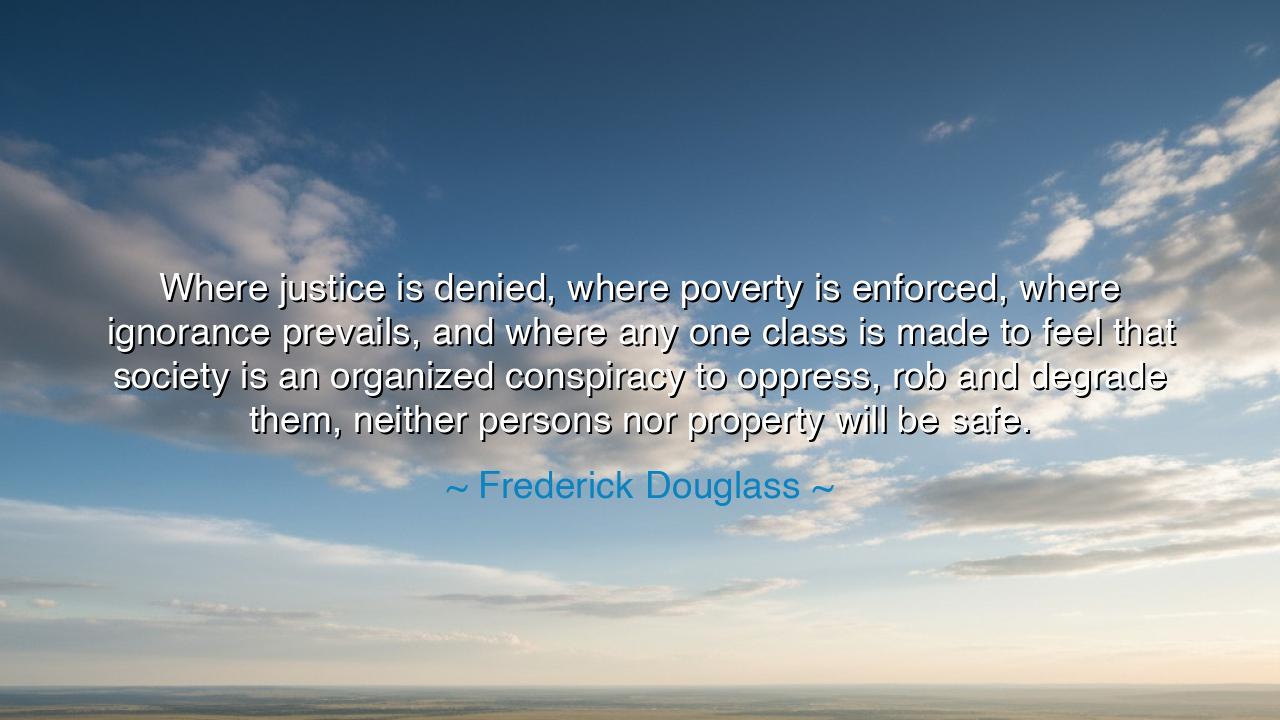
Where justice is denied, where poverty is enforced, where
Where justice is denied, where poverty is enforced, where ignorance prevails, and where any one class is made to feel that society is an organized conspiracy to oppress, rob and degrade them, neither persons nor property will be safe.






In the grand sweep of history, the struggles of humanity have often been rooted in the fight for justice. The ancient world was no stranger to this battle, where the oppressed faced the weight of injustice, and the powerful sought to maintain their grip on wealth and power. In the words of Frederick Douglass, “Where justice is denied, where poverty is enforced, where ignorance prevails, and where any one class is made to feel that society is an organized conspiracy to oppress, rob, and degrade them, neither persons nor property will be safe.” These words are a warning, a prophecy of the chaos that arises when society forsakes its duty to uplift all its members, when it turns a blind eye to the suffering of the marginalized, and when it allows inequality to fester unchecked.
The denial of justice is the foundation upon which all other societal ills are built. When the law fails to protect the weak, when it is used as a tool for the oppressor, justice becomes a mere illusion. The ancient Greeks understood this deeply, for they believed that a society’s strength lay not in its armies or wealth, but in its adherence to justice. Plato’s Republic spoke of the ideal society as one where justice prevailed, ensuring that each individual received what was rightfully theirs. But when justice is denied, the foundations of society crumble, for without it, the very fabric of human relationships becomes frail and fragile.
In the face of poverty, the oppression of individuals becomes even more apparent. Douglass knew this well, for he lived through the brutality of slavery, where the poor were seen as less than human, treated as property to be bought, sold, and worked until broken. Poverty is not merely a lack of material wealth, but a stripping away of dignity, of the opportunity to thrive and contribute to society. The great empires of the world, from Rome to Britain, have all witnessed how poverty breeds despair, how it fuels anger, and how it divides a nation into the haves and the have-nots. A society that enforces poverty—whether through systemic inequalities or exploitation—destroys not only the lives of the impoverished but the very soul of the nation itself.
Equally dangerous is the ignorance that Douglass speaks of. A society that fails to educate its people, that keeps its citizens in the dark, cannot thrive. The ancient civilizations understood that knowledge is the great equalizer, that an educated populace is the backbone of a just society. In ancient Athens, education was revered as the path to virtue and wisdom. To be ignorant is not merely to lack information; it is to be powerless, to be easily manipulated and controlled. When ignorance prevails, the truth is hidden, and those who hold power can manipulate the masses, keeping them subjugated in both mind and body.
But perhaps the most powerful part of Douglass’s quote is the warning about oppression and how it is felt by the oppressed. When a society is structured in such a way that one class feels that it is targeted, that it is the victim of a deliberate conspiracy to rob and degrade them, the social contract is broken. Douglass himself lived through such a system, where slavery dehumanized an entire race, stripping them of dignity, identity, and the right to live as free men and women. When people are made to feel that their humanity is denied, they will not accept their condition quietly. History is full of rebellions, from Spartacus’ slave revolt in ancient Rome to the French Revolution, where the oppressed rose up against those who had long exploited them. Oppression breeds resistance, and when people are pushed too far, violence and chaos inevitably follow.
The lesson for us today is clear: justice must be the foundation of any society. We must ensure that all people are treated with dignity, that poverty is not enforced through inequality or exploitation, and that ignorance does not keep the masses in chains. Every individual must have access to education, the light that illuminates the path to freedom and understanding. Society must recognize that oppression and inequality cannot be tolerated, for when a class feels that it is being robbed and degraded, the very safety of all members of society is at risk.
Let us then commit ourselves to building a just society, one where freedom, knowledge, and dignity are accessible to all. Let us stand against oppression in all its forms and ensure that justice is not a privilege for the few, but a right for all. Douglass’s words are not merely a reflection of the past; they are a warning for our present and future. A society that ignores its moral duty to the oppressed, to the uneducated, and to the impoverished will one day find that its foundation is crumbling. Let us not wait until it is too late to act.






AAdministratorAdministrator
Welcome, honored guests. Please leave a comment, we will respond soon